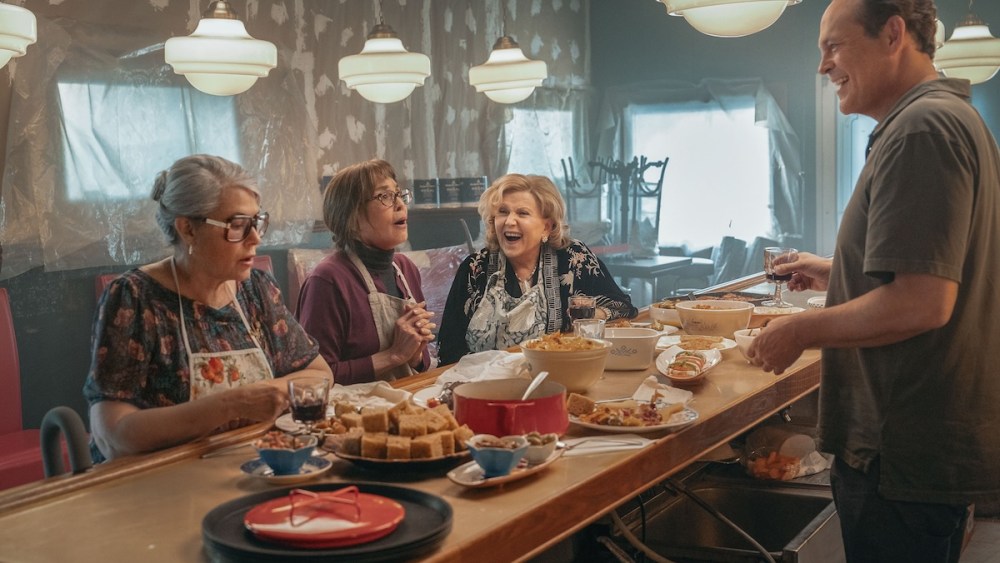The ingredients are simple, the cooking process unhurried and the history rich. The Italian dishes honored in director Stephen Chbosky’s sentimental dramedy “Nonnas” don’t come from professionally trained chefs, but from women of Italian heritage whose flavors have been perfected over generations. Each forkful packs a tasty homage to where they come from and to the people who loved them. And some of the film’s components are indeed authentic: Liz Maccie’s screenplay provides a fictionalized take on how Jody Scaravella opened Enoteca Maria, a real-life Italian restaurant where grandmothers cook.
MTA worker Joe (Vince Vaughn) has just lost his mother. The opening sequence shows him as a child observing as his mother and “nonna” (or grandmother) cook a feast for friends and family. Those halcyon days appear soaked in an ethereal lighting to convey nostalgia. In the present, when everyone has left the funeral, it’s the dishes they prepared for him that remain as edible manifestations of their affection. Yet, his nonna’s Sunday gravy is the taste he misses most, a flavor so specific it seems irreplicable without the actual recipe. It doesn’t take long for Joe to proclaim the notion that cooking is an expression of love, the not-so-original central theme of the often saccharine and occasionally touching story.
And when his lifelong pall Bruno (Joe Manganiello) and his wife Stella (Drea de Matteo) suggest he utilize his mother’s insurance money to make a change in his life, Joe enlists a quartet of nonnas to be the chefs at a new restaurant he plans to open on Staten Island: Enoteca Maria, in honor of the women in his family. There’s Roberta (Lorraine Bracco), his mother’s grumpy Bolognese best friend. A Craigslist ad brings former nun Teresa (Talia Shire) and Antonella (Brenda Vaccaro), a no-nonsense Sicilian. As for desserts, Joe convinces his mother’s hairdresser Gia (Susan Sarandon) to lend the business her talents.
Casting these women is itself a celebration of Italian American culture, as some of them have appeared in several of the most notable movies and shows centering this specific ethnic community: Bracco starred in “Goodfellas” and “The Sopranos,” while Shire acted in “The Godfather” and the “Rocky” movies. Along with Antonella comes her neighbor Olivia (Linda Cardellini), who was Joe’s high school sweetheart, to further pack the plot with a romantic thread that comes across as if forcefully inserted to give Vaughn’s character a secondary, if unimaginative motivation on top of his heartfelt devotion for his mother.
Although Vaughn’s dialogue throughout is ridden with platitudes, the actor’s everyday-dude sincerity keeps the lines as grounded as they can be. One believes him as an average, blue collar guy housing a soft heart inside an imposing figure. Elsewhere, Maccie’s screenplay feels engineered to integrate all of the loose subplots into an unnaturally tidy whole by the end, including a letter that Joe’s mother left behind for him, and the notion that Staten Island locals might be displeased with an outsider opening a restaurant there. The ordeal is coated almost from beginning to end with classic Italian-language songs, as well as tracks in English that speak of the immigrant experience in New York City.
“Nonnas” finds its richest moments when the seasoned actresses share the screen to bicker about the specific regions in Italy they consider their homelands or to contemplate their past mistakes. Sarandon delights in a tailored-made role as the most stylish and forward-thinking of the bunch. That her character owns a hair salon comes into play during a scene where the nonnas get a makeover while drinking limoncello and dishing about their dead husbands, the lovers that got away or the pitfalls of raising children. Their candid banter makes one wish the film would live up to its title and make them the protagonists, similar to how “Tea With the Dames” or the more recent “80 for Brady” did for their leading ladies.
As a food-centric movie, “Nonnas” features luscious, mouth-watering closeups of sauces, soups and meats that the seasoned cooks put together, but doesn’t much engage with their origin or significance in a large cultural or historical context. The use of food not as the main course but as a vehicle to explore familial bonds here calls to mind the tone and ideas of María Ripoll’s “Tortilla Soup,” about a Mexican American chef and his three daughters. “Nonnas” repeatedly drives home its point about the unifying force of a homecooked meal as an embodiment of community, and even as it overcrowds its narrative pot with too many unnecessary condiments that get lost in the mix, the result is ultimately palatable.
Read the full article here


